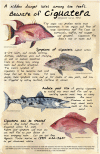Ciguatera fish poisoning: treatment, prevention and management
- PMID: 19005579
- PMCID: PMC2579736
- DOI: 10.3390/md20080022
Ciguatera fish poisoning: treatment, prevention and management
Abstract
Ciguatera Fish Poisoning (CFP) is the most frequently reported seafood-toxin illness in the world, and it causes substantial physical and functional impact. It produces a myriad of gastrointestinal, neurologic and/or cardiovascular symptoms which last days to weeks, or even months. Although there are reports of symptom amelioration with some interventions (e.g. IV mannitol), the appropriate treatment for CFP remains unclear to many physicians. We review the literature on the treatments for CFP, including randomized controlled studies and anecdotal reports. The article is intended to clarify treatment options, and provide information about management and prevention of CFP, for emergency room physicians, poison control information providers, other health care providers, and patients.
Keywords: ciguatera fish poisoning; ciguatoxin; harmful algal bloom (HAB); human health; marine toxins; treatment.
Figures
References
-
- Swift AE. Ciguatera. J Toxicol - Clin Toxicol. 1993;31:1–29. - PubMed
-
- Gillespie NC. Ciguatera in Australia. Occurrence, clinical features, pathophysiology and management. Med J Austr. 1986;145:584–590. - PubMed
-
- Lehane L. Ciguatera: recent advances but the risk remains. Int J Food Microbiol. 2000;61:91–125. - PubMed
Publication types
MeSH terms
Substances
Grants and funding
LinkOut - more resources
Full Text Sources
Other Literature Sources
Miscellaneous

